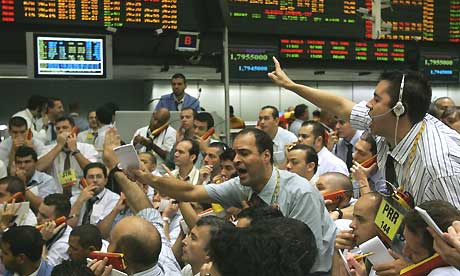In the film Wall Street, which symbolised the excess of the 1980s, the most successful traders were odious alpha-males with aggression seeping from every pore.
But stereotypes often have a kernel of truth, and researchers from Cambridge University have concluded what everyone outside the City has always suspected.
Money doesn't make the world go round: it's testosterone. The more that traders have, the richer they'll become - up to a point.
John Coates, who used to manage a trading floor at Deutsche Bank on Wall Street but is now at the Judge Business School at Cambridge University, and Professor Joe Herbert, a neuroscientist, set out to study the brains of City traders to discover what makes them tick.
They measured levels of testosterone and cortisol (a stress hormone) in 17 traders at a City of London bank for eight consecutive business days. They found that those traders with higher testosterone levels in the morning were most likely to make money on the day's trading. One trader hit a six-day "winning streak" during which he made more than double his daily profit. During that time his testosterone levels went up 74%.
The team also found that cortisol levels among the traders increased when their takings became more volatile and the market generally was less stable. The results were published yesterday in the Proceedings of the National Academy of Sciences.
"You can get this positive feedback loop between winning, testosterone, greater confidence and risk taking," Coates said.
He believes his work taps into the "winner effect" that scientists have found in numerous competitive situations, from fighting male animals to human athletes. In one-on-one competitions, men gain a testosterone boost when they win. This gives them an advantage in the next bout and if they win that they get a further advantage. And so on. Coates' study suggests that this is happening even in the world of financial derivatives trading.
But he admitted it is not that simple. "My great fear is that ... people will walk away with the idea that if you want to make money in the markets you had better have a lot of testosterone," he said.
He thinks there comes a point when traders have too much testosterone and so start to take irrational risks. That is when the bubble bursts and the market crashes.
At this point, the stress hormone cortisol becomes significant. Coates believes that prolonged high levels of cortisol - triggered by a rapidly falling market - lead to anxiety and clouded judgment. "You tend to see danger everywhere rather than opportunity. In that situation you don't do anything.
"People get paralysed by the fear. [It] takes over so they are no longer thinking rationally. They are no longer doing the things that they should be doing to make money."
So, for every boom it creates, testosterone is most likely behind every bust too.
Coates pointed to the irrational way some people reacted to the slump eight years ago. "During the dotcom bubble I became really curious about the behaviour of people who were caught up in the bubble. "They weren't acting in a way that accorded with any of the predictions of economics or finance. I thought these people were on a drug. They weren't themselves. You could snap your fingers in front of their eyes and wave your hands. They just weren't there."
He believes the traders, who are almost all young men, were profoundly influenced by the testosterone hit they get from the job. But, he said, primeval brain mechanisms activated by the hormone can also lead them to irrational risk-taking. "I think this molecule is partly responsible for financial instability."
A City trader who wanted to remain anonymous said Coates' description fits with the competitive and high risk atmosphere on the trading floor. "It's about taking risks. Everyone trading is taking risks of some sort.
Among lessons Coates draws is that trading floors need more women and older men who have lower testosterone levels and cooler heads.
Explainer: Growth hormone
Testosterone is produced mainly by the testes in men and the ovaries in women, as well as by the adrenal gland. Levels in women are much lower. It is an anabolic steroid that is responsible for the male growth spurt at puberty and for maintaining muscle mass and strength. Testosterone also influences adam's apple growth and body hair growth during puberty.
The testosterone levels that foetuses experience appear to have a strong influence on their personality. High levels lead to slower social development in children. As an adult, higher testosterone levels are associated with higher libido, aggression and baldness. But levels decline with age and lower levels in older men seem to make them more at risk of developing Alzheimer's disease.
